- Home
- Al Sarrantonio
The Orangefield Cycle Omnibus Page 3
The Orangefield Cycle Omnibus Read online
Page 3
By the clock, he saw that it was eight in the morning.
I worked five hours straight. Amazing.
Three tiny shadows passed by the window in front of the sun, hovering briefly before the screen, and he saw that they were yellow jackets. Briefly, he remembered the newspaper story from the day before. A shiver started, but was suppressed by tiredness.
He stretched, suddenly remembering Ginny.
I hope she just drifted off to sleep, and didn’t wait for me.
He rose, stretched as if his frame had been locked into a sitting position for a year, rubbing his eyes while yawning, and left the office, tramping upstairs.
He thought of making coffee, but knew he would never stay awake while it brewed.
In the front hallway, he walked around Ginny’s pile of belongings, noting with curiosity that the front door was open.
Upstairs, Ginny was not in the bedroom.
She was nowhere in the house.
On the pile of her belongings, perched like a bird, was a note: Peter, I’m sorry, but I have to leave….
Chapter Six
“And there’s a possibility the note may have been written the previous night, before your reconciliation?”
“Yes.”
“Thing I don’t get is, Mr. Kerlan: why’d she leave without her things?”
Detective Bill Grant had been nice enough in the beginning, even solicitous; but now, standing with the man in the front hallway of the house, Peter sensed a change in the atmosphere, an aggressiveness that hadn’t been present before. At first all the questions had been about Ginny, where she might have gone, why she would have left, but now, Grant couldn’t seem to take his eyes off the pile of belongings in the hallway. Peter could tell it stuck like a wad of gum to the roof of the man’s mouth.
“I told you, detective, we had a fight Sunday. A big one. I was sleeping on the couch when she came home, and when I woke up all of her stuff was in the hallway—”
“She packed while you were asleep—”
“Yes. And when I woke up we started the fight all over again. By the end of it we had squared things away, I thought. Ginny went up to bed and I went down to my office to work —”
“This was late, almost midnight—?”
“Yes.”
“And you worked through the entire night—” Grant said, referring to his notes. “And when you went upstairs —”
He looked up at Kerlan from his pad, and for the first time Peter sensed a faint belligerence from the man.
“When I went upstairs she was gone.”
The detective snapped his fingers. “Just like that?”
“Yes.”
“Left her belongings, her car, just took off after you had supposedly settled everything?” He gave a twist in emphasis to the word “supposedly,” making it sound almost sinister.
“That’s exactly right.”
“And you called us after you spent yesterday looking everywhere she might have gone, including her sister; an…” he consulted his notes “…uncle in Chicago, her best friend from college, and even your own mother.” He glanced sideways from his notebook at Kerlan. “Your mother?”
“My mother and Ginny are very close. I could see her going there, yes. Ginny’s own parents are dead.”
Grant nodded briefly, went back to his notes. “You called all the local motels and hotels… that about the whole story?”
“Yes.”
Grant straightened, turning his notebook to a new page. “Well, maybe not exactly, Mr. Kerlan. I’d like to fill in a few blanks, if you don’t mind.”
“Anything you want.”
“All right, then. Let’s see…” Grant was running his eyes down a notebook page, flipped back to the previous page and did the same. He had the sallow, heavy-lidded look of a heavy drinker. But his eyes, which were bright blue in a rough, stubbled face, making them startling, pinned Peter suddenly.
“Let’s start with you being asleep on the couch on Sunday. You were taking a nap?” Again the emphasis on a word, this time “nap,” which made Grant sound incredulous.
“I’d had a few drinks, and was sleeping that off.”
“Ah.” This seemed to satisfy Grant and he went on searching his notes. Kerlan had the feeling that the detective already had a list of laser sharp questions in a neat list in his head, and was only scanning the notebook for effect.
“You had two fights with your wife that day?”
“One at breakfast time and then another that night.”
“You fought a lot?”
“Recently, yes.”
“Marital… trouble?” Grant let this hand in the air, waving his pencil in a little circle to make the question more than it was.
“I’ve been having trouble with my work. It carried over.”
“Any other obvious difficulties? Money? Sex life? You having an affair, maybe?”
Kerlan blinked, surprised at the question. “No. Nothing like that.”
“Nothing like that.” Grant nodded to himself, making a note on his current page. “You drink a lot, Mr. Kerlan?”
Again, he was taken aback. “No. Occasionally I have a few.”
“Have a few…. You ever hit your wife? Slap her around?”
Now Peter became angry. “No.”
Grant nodded, made a note.
“You can’t think of anywhere else she might have gone, anyone else she might have gone to see?”
“No.”
The detective eyed the pile of goods stacked in the hallway for perhaps the twentieth time. “Any idea why she left her stuff behind, Mr. Kerlan?”
“That’s the part I don’t get.”
“Me too. If you were running away, would you leave all your things behind after spending the time and trouble to stack it all up in the hallways by the front door?”
“No, I wouldn’t.”
Suddenly the detective straightened again, turning it into a stretch. He flipped the notebook closed and pocketed his pen in the side pocket of his jacket. His tie was loosened, Peter noticed.
Without warning, Grant smiled, making Peter blink.
“Thanks, Mr. Kerlan. I’ve got everything I need for now. We’ll check over everything you’ve done already, and widen the motel and hotel search a little into the next county. It’s kind of early yet to be too worried. I’ll be in touch.” He suddenly winked, and held out his hand. “If she shows up give me a call, will you?”
Peter went to shake the hand but then saw that there was a business card in it, which he took automatically.
“I will, detective.”
“Do that.” Grant turned on his heels and was out the front door and into his sedan almost before Peter could answer. Peter saw him light a cigarette as he climbed into the car.
He watched the detective pull out of the driveway over a mat of yet-raked leaves. In the last two days the trees had almost denuded themselves completely, leaving a riot of reds and yellows on his lawn. Peter idly noticed that the Meyers’ had cleared and bagged their own front yard, the neatly clipped grass of which showed yellow green. Their three pumpkins had settled into a neat row — smallest at the top, fattest of the three at the bottom. In their picture window were Halloween cut-outs: a jointed white skeleton with a toothy grin, a black-clad witch riding a broomstick angled up toward a sickle reddish moon.
Halloween was only three weeks away.
And it was still too damned hot.
He turned away from the front door, confronted by the mute pile of Ginny’s belongings.
For a moment, tears welled up in his eyes.
Ginny, where are you?
I thought we had fixed it? I thought we were okay?
The boxes, the suitcases, the bags of clothing, remained mute.
Chapter Seven
He first felt not a sting, but the vague, insistent, faint, tiny itch of an insect on his leg.
He swiveled in his armchair, bending his left leg and at the same time brushing at the itch; something s
mall, dark and solid dropped from his leg and melded with the carpet beside his desk. It wriggled there for a moment, righting itself in a tiny lifting of small wings, and he bent to examine it, suppressing a sudden shudder.
It was a hornet, not much past pupae stage, its tiger stripes muted into almost orange and black.
He remembered the story in the newspaper; the children stung by a legion of hornets from a nest they had disturbed—
“How in hell—” he said, lifting his carpeted slipper almost without thinking to grind the insect into the carpet before it could advance or, possibly, take flight.
Suppressing another shudder, he drew his foot away, dragging it across the carpet to rid the slipper’s bottom of the creature’s remains. A diminishing line of bug guts, looking dry and powdery and papery, trailed the low cut gray rug till they came to a point and disappeared.
Have to clean that later, he thought, turning back to his work.
The basement office’s single screened window was open above his desk, and for a moment he idly heard a buzz and looked up.
There, outside, was a fat bumblebee, just bumping the screen before lumbering airily off.
Before turning back to his work he let his eyes roam over the screen, looking for torn corners or holes; there were none.
Didn’t get in that way.
He turned back to his work, which was still going well; after sending the Halloween story to Parade magazine on Monday he’d discovered he had more to say on the subject of Samhain — or, as he called his own cute little version, Sam.
Almost immediately the phone rang, and he clutched his pencil, almost throwing it down angrily, before dropping it on the desk and, with a sigh, picking up the receiver.
“Yes?”
It was Revell on the other end of the line, asking after him.
“I’d be doing a lot better,” Peter said, trying to keep the testiness out of his voice, “if I didn’t have people like you bothering me.”
Revell said with false concern, “I’m just worried about you, Pete.”
Are you?
“Thanks for the concern.”
“You heard anything more from the police?”
“No. They don’t have anything new.”
Unless Ginny’s with you after all, you bastard.
“Well, let me know if you need anything,” Revell said. “I—”
Peter cut him off. “I really have to get back to work.”
“Nothing wrong with that. Take your mind off what you’re going through. Actually, that’s the reason I called—”
Of course it is, you bastard. He recalled what Ginny had said: “He would drop you in a second if you stopped producing…”
“I’ve got to go. I’ll call you soon.”
Like hell I will.
He half-slammed the phone down, stared at the wall next to his desk.
Something was crawling up it, above the wooden filing cabinet that held his printer, muted orange and black stripes—
“What the fu—”
He reached out a palm, hit it flat; the hornet, still whole, tumbled from the wall behind the metal filing cabinet and was lost to view.
He was on his feet, pushing his swivel chair back and pressing his head against the wall to try to locate the insect behind the cabinet; unable to, he stalked from the office in anger and went to his messy workbench at the other end of the basement, pushing objects aside — a power screwdriver, coffee tin of miscellaneous nails — until he located a flashlight. He turned back toward the office, flipping the flashlight switch, which produced a click but no light beam.
“Shit!”
He reversed stride, rummaged through the wreckage on top of the workbench, then pulled drawers open until he found an opened four pack of D cells; he unscrewed the flashlight’s top, turned it over impatiently, dropping one of the two batteries within from his waiting palm to the floor where it rolled beneath the bench.
“Shit! Shit!” He kicked the bench once, pulled back his slipper to kick it again before breathing deeply and turning his attention to the new batteries, which he shoved viciously into the flashlight’s tubular body before screwing the head back on and flipping it on once more.
Light shone this time, blinked out until his smacked the tool against his palm, hard.
The beam stayed on.
He strode back to the office and played the beam on the wall above the filing cabinet. Getting closer, he was about to shine it behind the cabinet when he saw an immature hornet crawling over the printer’s paper tray, and another on the wall beside it.
He cursed, put the flashlight down on the desk, looked for something to hit the insects with, and found a recent trade journal, which he rolled up, smacking the two hornets with it.
One dropped away to the rug; the other lay squashed against the printer’s paper roll.
Wary now, he looked in increments behind the printer; saw another insect making its way up the wall behind, and what looked like two others below it, showing movement.
Shivering, he drew back, moved away from the desk and toward the office’s door, his eyes glancing at the rug, the walls, the ceiling.
He closed the door behind him, dropped the rolled up magazine and climbed the steps to the house’s first floor two at a time.
He made his way to the front door, pushing his way past piles of Ginny’s clothes, Ginny’s books, her CDs.
He yanked open the front door, pushed open the screen, descended the porch’s four steps and walked quickly to the western rear corner of the house, which fronted his basement office and the bedroom above it.
The cable television and phone line entry, as well as the house’s gas main, were clustered near the side corner. He examined them, seeing no entry for an insect where the wires and gas line led into the house’s siding; everything was sealed and caulked.
He moved closer; a hornet flew past him, then another, and he spotted the entry, below the siding level. He watched a moment, saw a hornet fly to a spot near the corner of the house, where foundation met siding, land and crawl underneath the siding.
Edging closer, he crouched nearly to the ground, turning his head to examine beneath the siding.
There was a gap there in the wooden sill plate on which the house rested above the concrete foundation; it looked like the two boards which met at the corner had either not been properly butted, or that the butting board had shrunk, leaving an opening into an area between the house’s first floor and basement.
“Jesus,” he said, as a hornet crawled out from the space, flying past him with a rush as another crawled into the opening.
They had obviously built a nest back there.
“Damn.”
Filled with fury and resolve, he got to his feet, returned to the house and kicked his slippers off in the living room, looking for his deck shoes; they were nowhere to be seen and his searched down the hallway, almost reaching the back bedroom before finding the shoes nestled one against the other just outside the bedroom door.
He slipped them on, checked the pockets of his shorts for his car keys and then moved back outside, slamming the house door behind him.
I’ll take care of you, you bastards.
He got into his Honda, nearly leaving rubber as he backed out of the driveway, and was back in twenty minutes with two cans of Hornet and Wasp Killer. Barely reading the instructions, he pulled the safety tab from the top of one can, shoved the thin, hard plastic straw that came with it into the can’s top nozzle and shook the can as he marched back to the outside corner of the house.
Want to eat this? Enjoy it!
He stopped before the spot, watched a hornet alight and then crawl into the hidden opening, watched another crawl out and fly off. He crouched, thrusting the can’s nozzle forward and awkwardly trying to fit it under and into the opening.
The hard plastic straw missed, sliding away as a hornet, angered, crawled out, followed by another.
Flinching, he pressed the nozzle, watching the acrid
spray cover the two insects; they froze and dropped to the ground.
And now the rest of you bastards.
Still spraying, he crouched lower, his eye level below that of the foundation, and found the opening.
He angled the nozzle’s straw in and tightened his grip on the can’s trigger.
A single hornet fought its way out, dropped immediately to the ground. Another, coming from the outside, circled the opening, caught a whiff of escaping spray and also dropped.
He emptied the can, pushed himself back as three returning hornets began to circle the hole widely; one of the insects ventured into the hole, immediately retreated and then dropped to the ground. There was a long stain of spilled pesticide spray down the foundation under the hole, which began to dry as he watched.
A cloud of hornets circled the sprayed opening, darting toward it, landing tentatively on the lowest level of siding over the opening, took off again.
He shook the can, let a final spray cover them; all but one dropped to the ground as the remaining one flew off.
That’ll take care of you.
Breathing deeply, the adrenalin rush that had sustained him for the past hour receding, he went into the house, scooping up the second can of insect spray where he had deposited it on the front stoop, in time to hear the telephone begin to ring.
It was Don Revell again.
“Pete, I’m sorry to bother you again but you didn’t let me finish before. Parade was so wild about that Halloween piece you did that I showed it to Doubleday and they flipped. They’d like you to do more, and turn it into a book. We’re talking high five figures, maybe low six for this one—”
“I’ll think about it.”
“Jeez, what’s to think about? Just say yes and I’ll take care of the rest. They’re talking about publishing next Halloween, cash register dump display, a real push. These characters of yours could become perennials — you could turn one out every Halloween, have the kids waiting in line—”

 Five World Saga 01 Hornets and Others
Five World Saga 01 Hornets and Others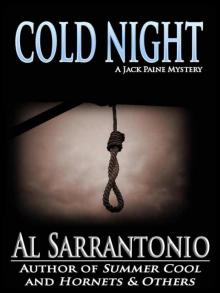 Cold Night (Jack Paine Mysteries)
Cold Night (Jack Paine Mysteries)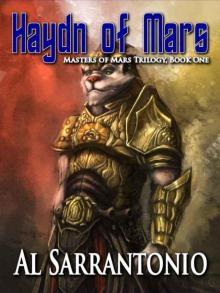 Haydn of Mars
Haydn of Mars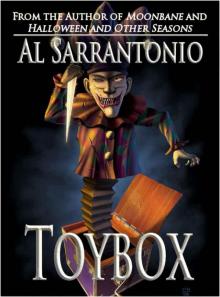 Toybox
Toybox Queen of Mars - Book III in the Masters of Mars Trilogy
Queen of Mars - Book III in the Masters of Mars Trilogy Exile
Exile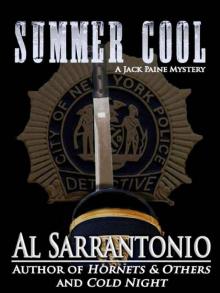 Summer Cool - A Jack Paine Mystery (Jack Paine Mysteries)
Summer Cool - A Jack Paine Mystery (Jack Paine Mysteries) Return - Book III of the Five Worlds Trilogy
Return - Book III of the Five Worlds Trilogy The Orangefield Cycle Omnibus
The Orangefield Cycle Omnibus Summer Cool jp-2
Summer Cool jp-2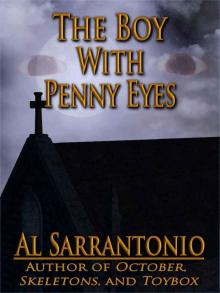 The Boy With Penny Eyes
The Boy With Penny Eyes Journey - Book II of the Five Worlds Trilogy
Journey - Book II of the Five Worlds Trilogy Kitt Peak
Kitt Peak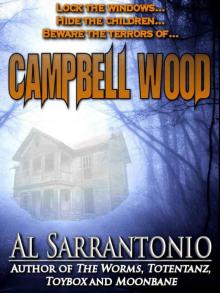 Campbell Wood
Campbell Wood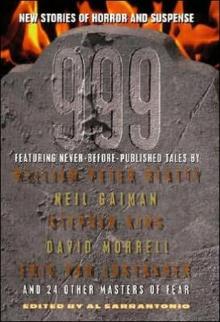 999
999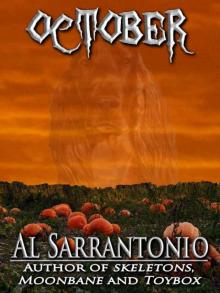 October
October Sebastian of Mars
Sebastian of Mars Moonbane
Moonbane Totentanz
Totentanz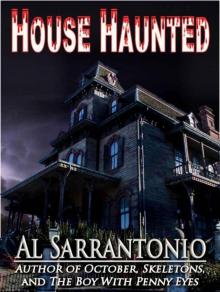 House Haunted
House Haunted Halloweenland
Halloweenland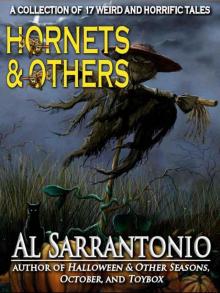 Hornets and Others
Hornets and Others